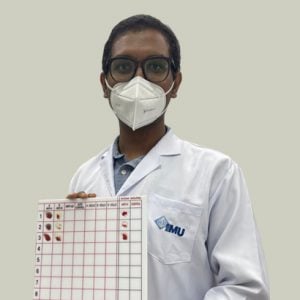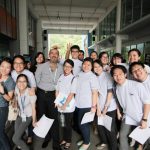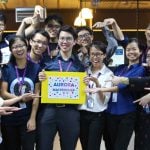I am Wong Xi Khai from PC117. On 21 January 2018, my group mates (Liew Hui Xuan and Leong Fang Yu) and I helped out in a recycling centre at Desa ParkCity. This project was conducted under one of our Semester 3 modules, which is the Environmental Chemistry module. Upon completion of the project, we were given a session to present and share what we had learnt in the activity to all students and lecturers. Before conducting this project, I did an online research and found out articles (Low awareness on recycling among Malaysians, The Star Online, 20 August 2017 and Malaysia’s recycling rate is still low, The Sun Daily, 21 April 2015) ) about the appalling rate of recycling in Malaysia. It was to my dismay to learn that the recycling rate in Malaysia in the year of 2016 was merely 17.5%. There is still a gap from the government target of 22% by year 2020. According to reports by SWCorp Malaysia, environmental policies have been implemented across the various states. In my opinion, efforts by the government would be futile if individuals do not cooperate. There should also be a shift of mindset for shared responsibility among various stakeholders such as individuals, non-governmental organisations, trading and commerce industry, and the government in order to reach the target set for year 2020. For a start, my team and I are eager to find out how NGOs and individuals are working together to help the environment. We did an online research and chance upon an organisation that operates an estimated amount of 300 community recycling points and recycling centres across Malaysia. This information intrigued our interest to find out how NGOs work with various stakeholders to achieve this scale of feat.
Tzu Chi Foundation is an international NGO with branch offices in 56 countries and regions. In Malaysia, there is an extensive showcase of Tzu Chi’s philosophy and practices of Environment Protection. Since the early 90s, volunteers have been actively promoting the concept of environmental protection through the establishment of recycling centres and encouraging residents in their community to participate in their recycling activities.
We planned to visit their various projects to understand how Tzu Chi is effective in promoting environmental protection. Through this visit, we hoped to achieve a few objectives, which include promoting community reuse and recycling initiatives, gaining knowledge of modern waste management, and learning the environmental benefits of waste minimisation.  However, out of three venues, we aborted our plan to drop by Jinjang Tzu Chi Preloved Centre as we exceeded our expected duration at the other venues. Commuting around was an issue as none of us can drive, but staying positive, we feel that this is a good chance to help reduce carbon footprint by carpooling to the recycling centre! Though our lack of foresight created some problems along the way, it was a good learning experience and given a chance, we will do more research to keep us well prepared. On 21 January 2018, we visited the Desa ParkCity Tzu Chi Recycling Centre. Brother Wen Cheng, the volunteer coordinator, greeted us and introduced to us how the recycling centre works. Firstly, it was really an eye-opener to see the heaps of recyclables waiting for us to work on. Brother Wen Cheng shared with us that residents in the nearby community transport bags of recycled materials to the centre each day. It is commendable that the recycling centre is organised and demarcated into different zones. In the sorting area, there were about 10 volunteers of all ages, including several silver-haired elderlies who come practically each day and young faces who volunteer during their free time. We were very impressed that the recycling volunteers did their work meticulously. Every single piece of paper and plastic were further split into the intricate system of classification. Despite it being time-consuming and eye-straining, we observed that the volunteers worked willingly without any complaint. We interviewed them and they told us that they are not working for money but purely to help conserve earth resources and leaving a better environment for future generations.
However, out of three venues, we aborted our plan to drop by Jinjang Tzu Chi Preloved Centre as we exceeded our expected duration at the other venues. Commuting around was an issue as none of us can drive, but staying positive, we feel that this is a good chance to help reduce carbon footprint by carpooling to the recycling centre! Though our lack of foresight created some problems along the way, it was a good learning experience and given a chance, we will do more research to keep us well prepared. On 21 January 2018, we visited the Desa ParkCity Tzu Chi Recycling Centre. Brother Wen Cheng, the volunteer coordinator, greeted us and introduced to us how the recycling centre works. Firstly, it was really an eye-opener to see the heaps of recyclables waiting for us to work on. Brother Wen Cheng shared with us that residents in the nearby community transport bags of recycled materials to the centre each day. It is commendable that the recycling centre is organised and demarcated into different zones. In the sorting area, there were about 10 volunteers of all ages, including several silver-haired elderlies who come practically each day and young faces who volunteer during their free time. We were very impressed that the recycling volunteers did their work meticulously. Every single piece of paper and plastic were further split into the intricate system of classification. Despite it being time-consuming and eye-straining, we observed that the volunteers worked willingly without any complaint. We interviewed them and they told us that they are not working for money but purely to help conserve earth resources and leaving a better environment for future generations.  After bidding goodbye to Brother Wen Cheng, we travelled to the 5R Eco Shop in Berjaya Time Square. Churning out a cycle of love, this social enterprise founded by the business leader of Berjaya Time Square and Tzu Chi aims to promote the concept of “5R”. There are a variety of items on sale donated by the public, such as clothes, shoes, handbags and jewelries. Earnings from the shop are then channelled to charities. We had a great time and we learned so much more than we could ever have by doing research online. A specific experience at the recycling centre shows there is a common mindset among Malaysians that “having more is better”. This trend of consumption creates waste problems and will lead to ecological destruction and natural resource deficits. I feel that the recycling activities at Tzu Chi is a good environmental education as they trigger and nurture behavioural change among the masses. Eco habits need to be cultivated together as a community. I know this because there is no lack of social consciousness among the volunteers and supporters of Tzu Chi Recycling Centre when it comes to saying and doing what needs to be done. This journey also reminded me that our emphasis should be on refusing our desires rather than recycling. Our efforts on recycling will never be able to overcome the amount of trash produced if we do not curb our overconsumption. This causal effect relationship between consumer and businesses is the main root of evil that damages the environment.
After bidding goodbye to Brother Wen Cheng, we travelled to the 5R Eco Shop in Berjaya Time Square. Churning out a cycle of love, this social enterprise founded by the business leader of Berjaya Time Square and Tzu Chi aims to promote the concept of “5R”. There are a variety of items on sale donated by the public, such as clothes, shoes, handbags and jewelries. Earnings from the shop are then channelled to charities. We had a great time and we learned so much more than we could ever have by doing research online. A specific experience at the recycling centre shows there is a common mindset among Malaysians that “having more is better”. This trend of consumption creates waste problems and will lead to ecological destruction and natural resource deficits. I feel that the recycling activities at Tzu Chi is a good environmental education as they trigger and nurture behavioural change among the masses. Eco habits need to be cultivated together as a community. I know this because there is no lack of social consciousness among the volunteers and supporters of Tzu Chi Recycling Centre when it comes to saying and doing what needs to be done. This journey also reminded me that our emphasis should be on refusing our desires rather than recycling. Our efforts on recycling will never be able to overcome the amount of trash produced if we do not curb our overconsumption. This causal effect relationship between consumer and businesses is the main root of evil that damages the environment.
Back to my community, I find it hard to do recycling alone even if it is a virtuous thing to do. Practical, time-strapped and space-challenged were the key reasons. Therefore, I did a proposal to the neighbourhood management to set up a recycling point for the residents. Now, my neighbourhood does not only have a recycling point for residents to segregate their waste, many of them know that this is an important action to take.
At the beginning, environmental protection should start from individuals, but for the impact to be greater, we should find strength in numbers. People from all walks of life should cherish our limited resources, conserve them and turn them into zero waste. There is ultimately only one earth for us to live in. We should work together to sustain it for our future generation and work together towards the ultimate goal of going beyond 2020.
Wong Xi Khai, Liew Hui Xuan and Leong Fang Yu are Pharmaceutical Chemistry students at the International Medical University, Malaysia.









